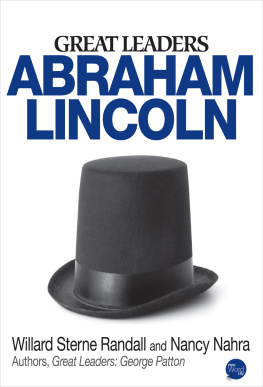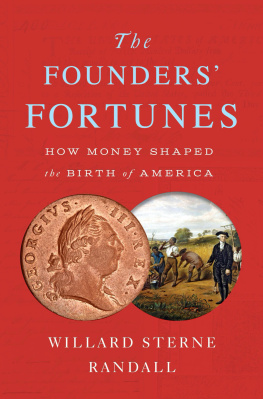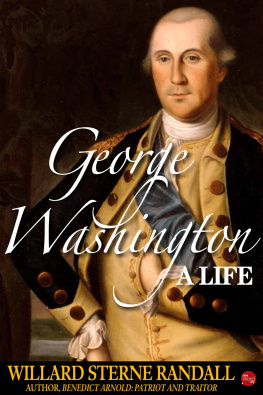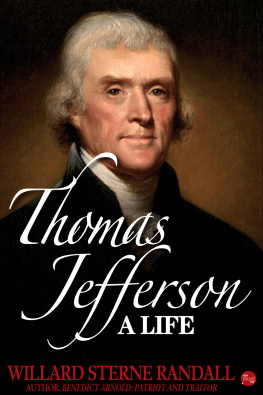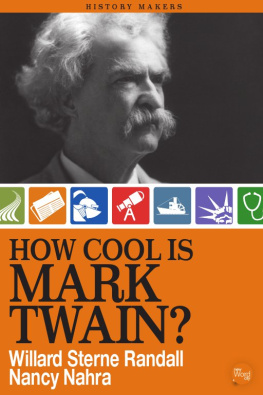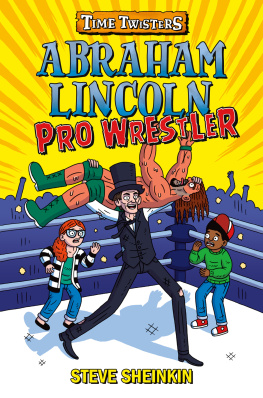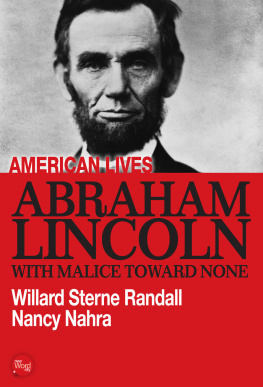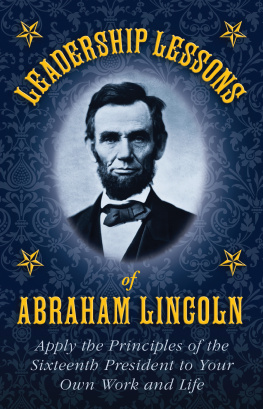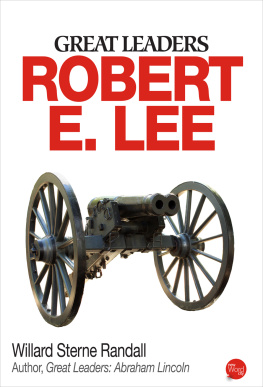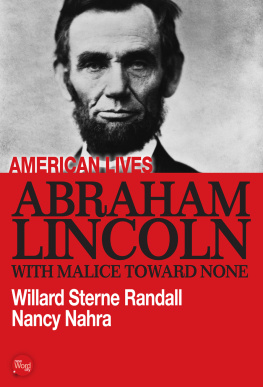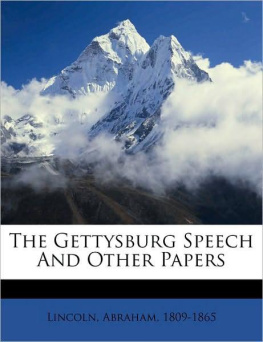Willard Sterne Randall - Abraham Lincoln
Here you can read online Willard Sterne Randall - Abraham Lincoln full text of the book (entire story) in english for free. Download pdf and epub, get meaning, cover and reviews about this ebook. year: 2013, publisher: New Word City, genre: Non-fiction. Description of the work, (preface) as well as reviews are available. Best literature library LitArk.com created for fans of good reading and offers a wide selection of genres:
Romance novel
Science fiction
Adventure
Detective
Science
History
Home and family
Prose
Art
Politics
Computer
Non-fiction
Religion
Business
Children
Humor
Choose a favorite category and find really read worthwhile books. Enjoy immersion in the world of imagination, feel the emotions of the characters or learn something new for yourself, make an fascinating discovery.
- Book:Abraham Lincoln
- Author:
- Publisher:New Word City
- Genre:
- Year:2013
- Rating:4 / 5
- Favourites:Add to favourites
- Your mark:
- 80
- 1
- 2
- 3
- 4
- 5
Abraham Lincoln: summary, description and annotation
We offer to read an annotation, description, summary or preface (depends on what the author of the book "Abraham Lincoln" wrote himself). If you haven't found the necessary information about the book — write in the comments, we will try to find it.
Abraham Lincoln ranks as one of Americas greatest presidents. Here, in this short-form book, is his inspiring story, along with lessons for every leader.
Willard Sterne Randall: author's other books
Who wrote Abraham Lincoln? Find out the surname, the name of the author of the book and a list of all author's works by series.
Abraham Lincoln — read online for free the complete book (whole text) full work
Below is the text of the book, divided by pages. System saving the place of the last page read, allows you to conveniently read the book "Abraham Lincoln" online for free, without having to search again every time where you left off. Put a bookmark, and you can go to the page where you finished reading at any time.
Font size:
Interval:
Bookmark:
Growing up on the Midwestern frontier of the United States in the early 1800s, Abraham Lincoln never saw the full horror of slavery until he was nineteen, when he took a job as a deckhand on a flatboat, loaded it with farm produce, and helped pole it down the Ohio River into the Mississippi through the Deep South to New Orleans. As his companion on the trip, Allen Gentry, told the story years later, the two strolled into the city, and Lincoln was appalled at the sight of field hands and fancy girls being auctioned in a slave market. He doubled his fists tightly, his knuckles went white, Gentry said. Lincoln muttered, Allen, thats a disgrace. If I ever get a lick at that thing, Ill hit it hard. For most of his remaining thirty-six years, he wrestled with the issue of slavery and what he should - and could - do about it. In the end, still wrestling, he kept his promise and issued the Emancipation Proclamation.
That was a hard decision, as thorny as any of his efforts to win the Civil War and save his country from what he saw as its inevitable collapse as a divided nation. But Lincoln was in training for difficult issues. Nothing in his life had ever come easily.
Abraham Lincolns first American ancestor, Samuel, a weaver, emigrated from Hingham, England, to Hingham, Massachusetts, in 1636. His son Mordecai, a blacksmith, pulled up stakes in search of opportunity and moved to New Jersey. Subsequent generations of Lincolns settled in Indiana, Illinois, Kentucky, Pennsylvania, and Virginia.
The grandfather of the sixteenth president of the United States and the man for whom he was named owned a farm in Rockingham County, Virginia. During the Revolutionary War, Abraham served in the Virginia militia. After the war, in 1782, with his wife and five small children, he moved to Kentucky, home of his distant relative Daniel Boone. While plowing a field, Abraham Lincoln was shot and killed by an Indian. His son, Thomas, a farmer and carpenter by trade, went on to fight against the Indians as a Kentucky militiaman.
Thomas, President Lincolns father, had little schooling. He couldnt read, but he could sign his name. Lincolns mother, Nancy Hanks Lincoln, was also uneducated, but she was bright and energetic and eventually taught herself to read a little, although not to write. Tall and strong, she was a skilled wrestler at a time when the sport was popular with both men and women.
Thomas and Nancy married on June 12, 1806. For the next eighteen months, they lived in Elizabethtown, Kentucky, where, in 1807, their first child, Sarah, was born. The family then moved to another farm on 300 acres on the Nolin River near Hodgenville in Hardin County, Kentucky. Their crude log cabin was typical of the time: eighteen feet long and sixteen feet wide with a dirt floor, no windows, bear-skin rugs, and mattresses stuffed with corn husks. It was crowded, but there was plenty of food and game and wood for the fire.
In that cabin, on Sunday, February 12, 1809, the future president was born.
A year later, the Lincolns packed their belongings and moved again, this time ten miles away, to start clearing 230 acres on Knob Creek. But the Lincolns failed to secure legal title to their land, eventually losing not only the farm but years of backbreaking effort. It was a pattern that would be repeated time and again on the frontier.
Forced in 1816 to relocate his family once more, Thomas Lincoln took them to southwestern Indiana, then the farthest American frontier. There they settled on land that they could claim as a homestead from the federal government if they turned it into a productive farm. Given enough determination and backbreaking labor, there could be no question of their ownership.
Their possessions piled onto a wagon, the Lincolns boarded a ferry across the Ohio River. Then they made their way through virgin forests to Spencer County, where they began transforming their 160-acre wilderness into farmland. Seven-year-old Abe was already tall and strong enough to help his father build the cabin that would be his home for the rest of his childhood.
When Abe was nine, he was shattered by the death of his mother from milk sickness, a condition caused by drinking milk or eating meat from a cow that had fed on poisonous white snakeroot. He helped his father fashion her coffin from logs left over from building the cabin. The boy then whittled wooden pegs to hold the boards together.
Abe had been close to his mother and missed her terribly; her energy, craving for learning, and determination had stamped him. All I am or ever hope to be, I owe to my angel mother, he once wrote. His father soon remarried, as was usual in those days. Sarah Bush Johnston Lincoln, a widow with three children, proved to be kind to the tall, somber boy, encouraging him to read.
Abes taciturn father rarely spared him from the drudgery of clearing, plowing, and planting. When it came time to harvest the crops to feed the eight people living in the rude, unpainted cabin, the entire family pitched in. Abe and his sister Sarah attended a one-room schoolhouse, where, whenever a teacher came along, they were taught to read, write, add, and subtract. Abes formal education was erratic: By his own account, his entire time in school amounted to little more than a year. It was typical of the time. Teaching himself, young Lincoln read voraciously - Pilgrims Progress, Robinson Crusoe, Aesops Fables, and Parson Mason Weems less-than-accurate Life of Washington.
Years later in a speech before the New Jersey senate, Lincoln asked to be pardoned if on this occasion I mention that away back in my childhood, the earliest days of my being able to read, I got hold of a small book... Weems Life of Washington. I remember all the accounts there given of the battlefields and struggles for the liberties of the country... and you all know, for you have all been boys, how these early impressions last longer than any others.
With paper and books scarce on the frontier, Abe fashioned out of wood his own arithmetic workbook. He solved problems on the board, then shaved it clean with a drawknife, and started over. He was renowned for walking vast distances to borrow books, preferring reading to hunting, the pastime of most frontier boys.
As Abe learned when a horse kicked him in the head, life on a farm could be dangerous. His family feared for a few moments that the nine-year-old would never get to ten. But as he grew, Abe became adept with the axe, plow, and sickle; to supplement the familys meager income, his father hired him out to other farmers.
By the age of sixteen, Abe had shot up to six feet four. A gangly 160 pounds, he was a head taller than most men of his time. Awkward and rawboned, he had muscular arms and his thick, black hair stuck out in cowlicks, giving him something of a wild look. But his appearance was quickly forgotten when he began to speak. Even as a boy, his eloquence and humor were notable. He performed sidesplitting imitations of politicians for friends and neighbors gathered at the nearby general store. He had no trouble making friends.
Neither was it difficult for young Abe to find work after he did his chores at home. Working for neighboring farmers, Lincoln chopped wagonloads of firewood, cut and husked bushels of corn by hand, and threshed and flailed wheat. The first money he was allowed to pocket for himself came from tugging at the oars as he ferried passengers to steamboats on the Ohio River. He recruited friends, and they sold firewood to passing steamboats, earning him enough to buy his first white shirt.
Lincoln was strongly drawn to the river, his eras highway to the great world beyond the wilderness. He was just nineteen when he signed on to pole a flatboat to New Orleans for James Gentry, a store owner in a nearby village. Abe and Allen Gentry, the storekeepers son, were the entire crew. Still underage when he returned home, Lincoln, as was customary at the time, gave his wages to his father.
Font size:
Interval:
Bookmark:
Similar books «Abraham Lincoln»
Look at similar books to Abraham Lincoln. We have selected literature similar in name and meaning in the hope of providing readers with more options to find new, interesting, not yet read works.
Discussion, reviews of the book Abraham Lincoln and just readers' own opinions. Leave your comments, write what you think about the work, its meaning or the main characters. Specify what exactly you liked and what you didn't like, and why you think so.

